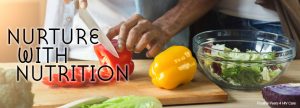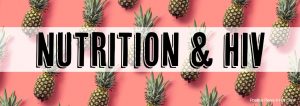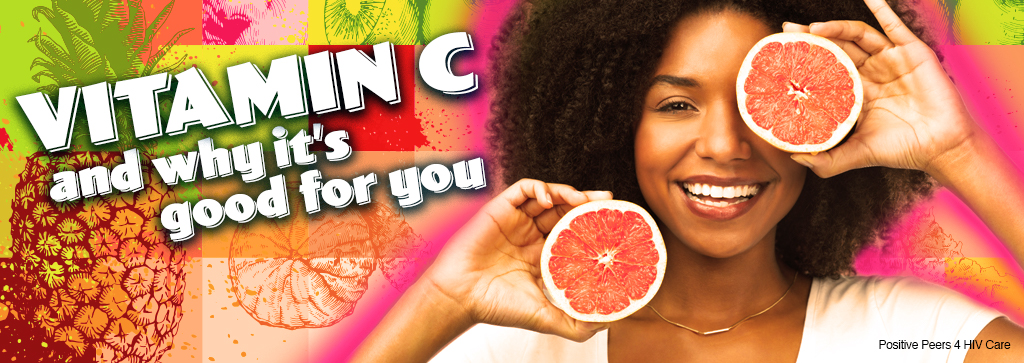
By: Ann K. Avery, MD, Infectious Disease Physician at MetroHealth Medical Center
Growing up, your mom or another close relative may have told you to drink your orange juice. That’s because orange juice is packed with vitamin C, which is an essential nutrient.
According to the National Institutes of Health, a nutrient is something found in the things you eat and drink that helps you function and stay healthy. There are a lot of different nutrients, and vitamin C is just one of them.
Vitamin C is water-soluble. That means it’s a nutrient that dissolves in water, unlike fat-soluble nutrients that dissolve in oil. Your body doesn’t typically store water-soluble nutrients like vitamin C, which means you need to consume them often.
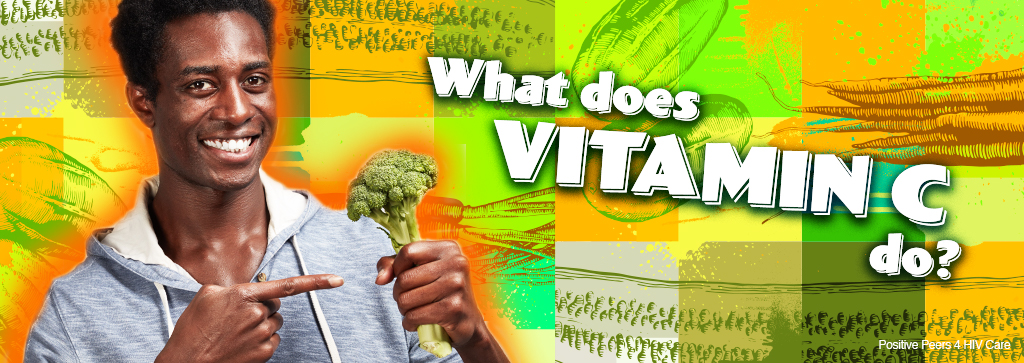
What does vitamin C do?
Antioxidants are substances that help boost your immune system, and vitamin C is one. There are other things vitamin C does for your body too.
Vitamin C protects you from free radicals: What is free radicals? Basically, when we eat food, it gets converted into energy, and free radicals get formed. Free radicals are also all around us in the form of ultraviolet sunlight, cigarette smoke, and air pollution.
Vitamin C makes collagen: Collagen is a protein that helps your wounds heal. Protein is another type of nutrients your body needs, and collagen is the main protein in all your connective
tissues. If your body is low in collagen, you’ll have problems with your skin, bones, tendons, and ligaments.
Vitamin C keeps your immune system working: Vitamin C will help protect your body from diseases such as cardiovascular disease and the common cold. It also helps with vision loss diseases like cataracts and cancer and helping with cancer treatment. Preventing disease is especially important for people living with HIV.
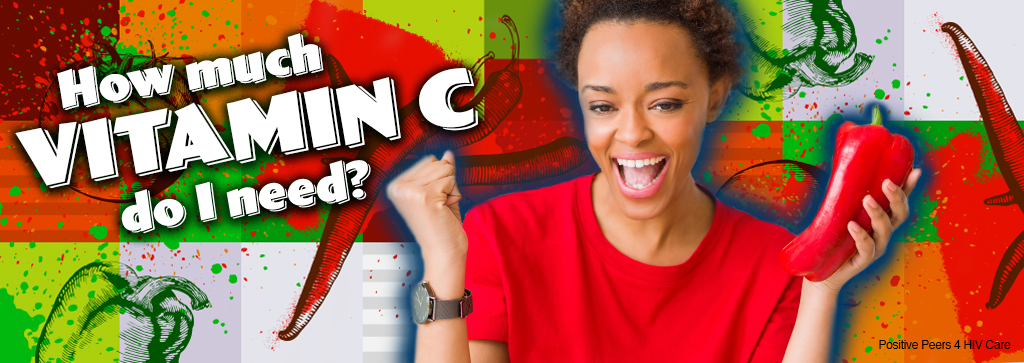
How much vitamin C do I need?
We’ve already established how important vitamin C is. Having a vitamin C deficiency causes something called scurvy. Maybe you’ve heard of it in pirate movies! Way back when sailors used to get scurvy from a lack of fruits and vegetables as they sailed the 7 seas! On the other hand, if you consume too much vitamin C, you’ll probably end up with stomach cramps, nausea, diarrhea, kidney stones. Not fun!
The best way to incorporate vitamin C into your diet is to eat your fruits and veggies. Here are a few foods that will give you the recommended servings of vitamin C:
● Red and green peppers
● Oranges, grapefruit, and other citrus fruit
● Kiwi
These foods also contain vitamin C:
● Tomatoes
● Broccoli
● Cantaloupe
● Strawberries
● Baked potatoes
Many other foods and beverages have vitamin C in them too. If you aren’t sure if something has vitamin C or another nutrient in it, check the food label! Also, the amount of vitamin C is often reduced by prolonged storage, cooking, microwaving, and steaming. The best way to get the full amount of vitamin C is to eat raw fruits and veggies.
The amount of vitamin C your body needs each day depends on how old you are. Take a look at this list to see the suggested servings in milligrams based on age:
● From birth to 6 months old - 40mg
● 7-12 months old - 50mg
● 1-3 years old - 15mg
● 4-8 years old - 25mg
● 9-13 years old - 45mg
● 14-18 years old - 75mg for boys, 65mg for girls
● Adults - 90mg for men, 75 for women
Your vitamin C intake may vary if you happen to be pregnant or breastfeeding.
● Pregnant teens - 80mg
● Pregnant adults - 85mg
● Breastfeeding teens - 115mg
● Breastfeeding adults - 120mg
Also, if you’re a smoker, make sure to add an extra 35mg of vitamin C to your daily total.
Come join our private, stigma-free, supportive community.
Health management tools with medication & appointment reminders.
Social networking in a community conversation & private chats.
Vitamin C and HIV
If you’re living with HIV, it may seem like a good idea to take a lot of multivitamin supplements to stay healthy. However, a study from Harvard has found that too many multivitamins will not only fail to help your HIV but can also raise liver levels if you take antiretrovirals. During the study, 3,418 people living with HIV were either given the recommended daily dose of vitamins B, C, and E or were given increased doses. They stopped the study early because of liver damage found in 38 percent of folks taking the increased doses. Viral loads and CD4 counts weren’t impacted.
People often try to strengthen their immune system by incorporating extra nutrients, vitamins, or herbal remedies into their diets. However, the effects of supplements are pretty limited. According to HIV specialists, the best way to get all the nutrients you need is to eat a healthy and balanced diet. Pro-tip, it’s important to make sure the fresh fruits and vegetables are washed well and not rotting or molding.
If you’d like to take a supplement or herbal remedy, make sure to talk to your doctor first. Some supplements and herbal remedies can interact with your meds. Vitamins, minerals, and supplements can have side effects. If you start taking a new supplement or vitamin, keep track of any changes in your body, and never take more than the recommended dose.
There are some supplements that aren’t recommended for people living with HIV because they can stop your meds for working correctly. Garlic capsules, St. John’s wort, African potato, and Sutherlandia all either stop or keep protease inhibitors, a class of antiviral drugs, and NNRTIs (non-nucleoside reverse transcriptase inhibitors) from working properly.
Other herbal supplements that may interact with HIV meds include ginkgo biloba, valerian, borage oil, liquorice, and milk thistle. Talk to your pharmacist about any possible interactions.
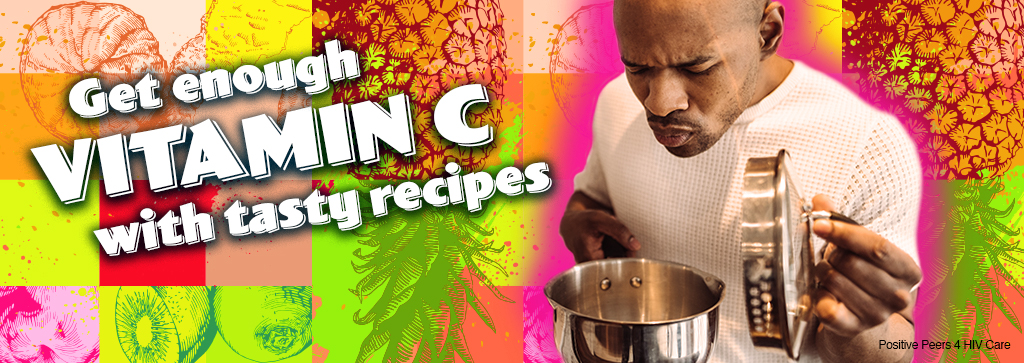
Get enough vitamin C with tasty recipes
It may seem like taking a lot of vitamin and mineral supplements will help you stay healthy, but taking too many will actually do you more harm than good.
Herbal remedies can also be dangerous if you’re living with HIV. So many of them interact with HIV medications, and sometimes that means your meds aren’t as effective as they should be! That’s pretty scary!
Here are a couple of yummy recipes that will help you on your way to getting enough vitamin C each day:
● Breakfast stuffed peppers
● Basil pesto pasta with roasted veggies
It’s actually pretty easy to get the right about of vitamin C in your diet because, as long as you’re eating a balanced diet, you’re good to go!
Related Blogs:

